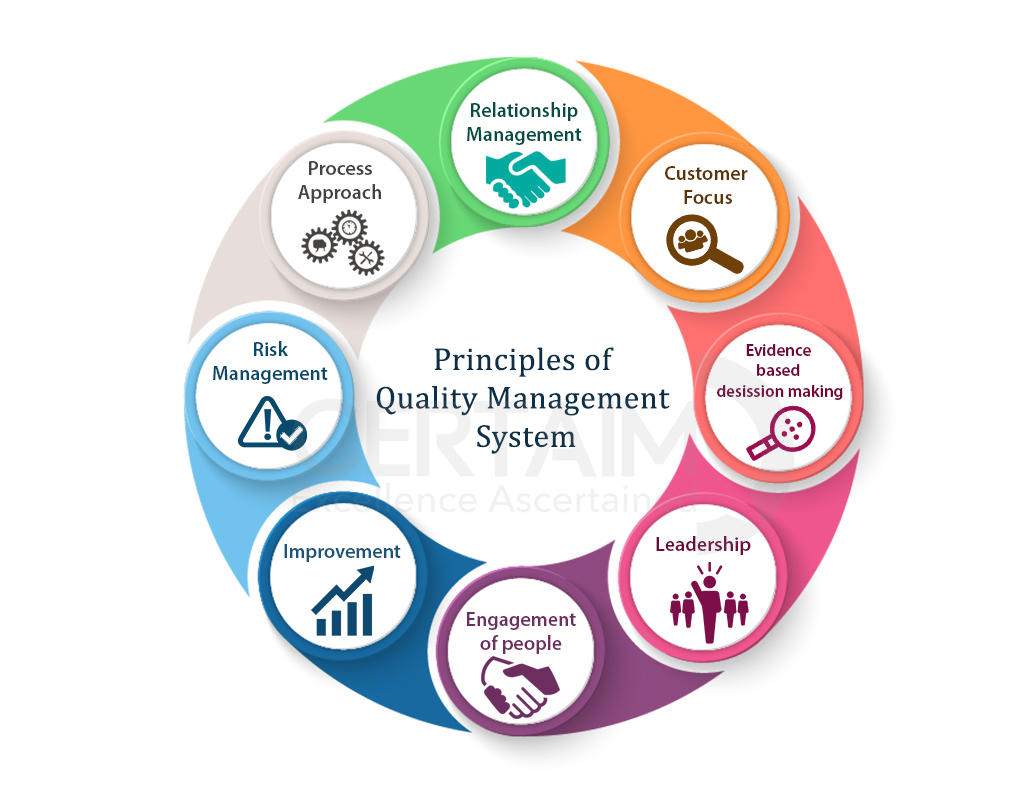Quality management
Quality management is the act of managing all requirements and policies to achieve a certain level of quality. This includes developing a quality plan, coming up with and carrying out quality assurance and planning, as well as quality control and improvement. Additionally, it is known as complete quality management. Generally, quality management prioritizes long-term objectives while putting short-term plans into action (Baron, 2022).
Quality management consists of four key components,
- Quality Planning
- Quality Improvement
- Quality Control
- Quality Assurance
Principles of Quality Management
 |
| Figure: Principles of Quality Management System Source : https://certaim.com/wp-content/uploads/2017/12/iso9001_ban3.jpg |
- Customer focus
- Leadership
- Engagement of people
- Process approach
- Continuous Improvement
- Evidence-based decision making
- Relationship management
Engagement of people
An additional key principle is employee participation. Whether they are full-time, part-time, outsourced, or internal employees, management involves all of them in developing and delivering value. A company should support its personnel in maintaining consistency and skill improvement.The principle also calls for giving employees control, including them in decision-making, and appreciating them for their achievements. People perform to the best of their abilities when they are valued because it increases their motivation and self-esteem. Employees feel empowered and responsible for their activities when they are fully involved.
Process approach
The process approach principle states that an organization's performance is essential. The approach principle places a strong emphasis on improving the effectiveness and efficiency of organizational processes. The strategy requires an understanding of how efficient procedures lead to increased consistency, quicker work, lower costs, waste removal, and ongoing improvement.
When leaders can manage and control a company's inputs, outputs, as well as the processes required to achieve those outcomes, the organization benefits.
Continuous Improvement
Every organization should develop a goal to actively participate in ongoing improvement. Businesses that continuously improve see improvements in organizational flexibility, performance, and the capacity to seize new possibilities. Businesses should be able to continuously develop new procedures and adjust to shifting market conditions.
Evidence-based decision-making
Businesses should use a fact-based approach when making decisions. Businesses that base their judgments on validated and evaluated data have better market knowledge. They can carry out actions that lead to specific goals and maintain their earlier decisions. Making decisions based on facts is essential for understanding the cause-and-effect links between various factors and for describing possible unexpected outcomes and effects.
Relationship management
The goal of relationship management is to develop relationships with suppliers and customers that are beneficial. A company's performance may be affected by several interested parties. In order to maximize the effect of its suppliers on the performance of the firm, the organization should effectively manage the supply chain process and strengthen relationships with them. A company is more likely to experience long-term corporate success and collaboration when it effectively handles its relationships with interested parties.
Benefits of Quality Management (Veeva, 2022)
- It helps a company in achieving higher accuracy across all tasks and activities involved in the creation of goods and services.
- It improves the use of time and other resources, increases process efficiency, and decreases waste
- It helps improve customer satisfaction.
- It enables organizations to easily sell their products and take advantage of new markets.
- Businesses may integrate new employees more easily as a result, which promotes more flexible growth management.
- It allows a company to develop its systems, procedures, and goods.
References
Baron, A. (2022). Quality management. Investopedia. [Online] Available at: https://www.investopedia.com/terms/q/quality-management.asp#:~:text=Quality%20management%20is%20the%20act,quality%20control%20and%20quality%20improvement. [Accessed on 15/07/2022].
CFI Team, (2022). Quality management. CFI. [Online] Available at: https://corporatefinanceinstitute.com/resources/knowledge/strategy/quality-management/ [Accessed on 15/07/2022].
Veeva, (2022). The ultimate guide to quality management. Veeva. [Online] Available at: https://www.industries.veeva.com/ultimate-guide-to-quality-management.[Accessed on 15/07/2022].




great work.
ReplyDeleteNicely arranged blog of quality management.very useful information.
ReplyDelete